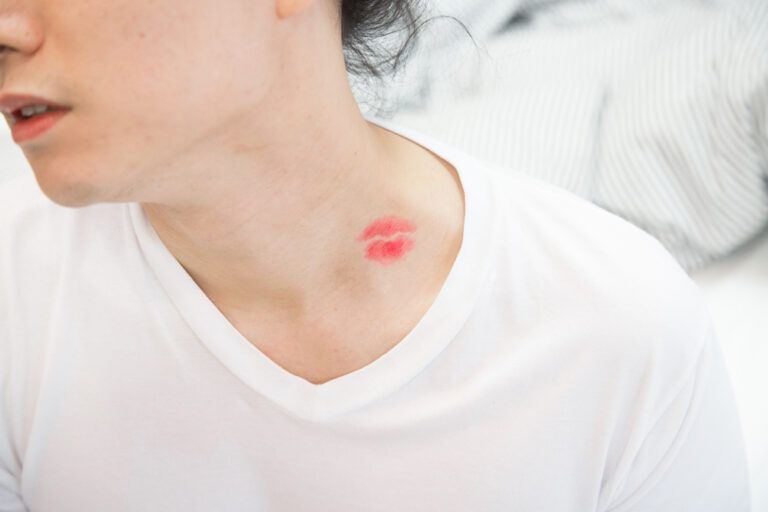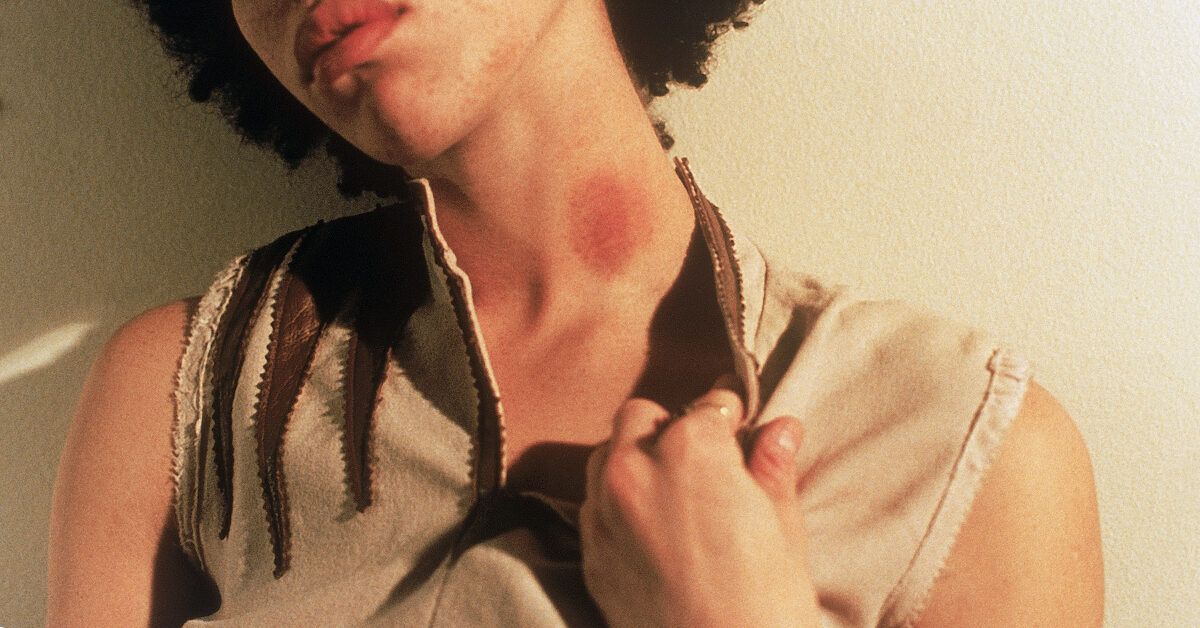Ever wondered if that little mark of affection could lead to something sinister? Let's set the record straight: hickeys do NOT cause cancer or other serious conditions. Despite the persistent rumors and whispers, the science is clear on this matter.
The worry stems from a place of misinformation, fueled by online chatter and unfounded anxieties. The truth is far less alarming. While hickeys might carry a temporary cosmetic concern, they pose no long-term health risk in the vast majority of cases. Understanding the physiological process behind their formation is key to dispelling the myths.
| Aspect | Details |
|---|---|
| Definition | A hickey, also known as a love bite, is a bruise caused by suction or biting, typically on the neck or arm. |
| Formation | Capillaries (small blood vessels) under the skin burst due to applied suction or pressure. |
| Cancer Risk | Zero scientific evidence links hickeys to cancer. |
| Duration | Usually fades within a week or two, depending on skin type and severity. |
| Potential Risks | Very rarely, a hickey might lead to a blood clot, potentially causing a stroke (carotid artery dissection). Individuals with blood clotting disorders are at higher risk. |
| Discomfort | Can be painful or uncomfortable for some, depending on location and intensity. |
| Remedies | Cold compress, aloe vera, vitamin K cream, and gentle massage can help fade the hickey. |
| Psychological Effects | May cause embarrassment, especially in public or social situations. |
| Source | WebMD |
A hickey, in simple terms, is a bruise. It arises when someone applies suction or pressure to the skin, most commonly on the neck, causing the tiny blood vessels, or capillaries, beneath the surface to rupture. This breakage results in the leakage of blood into the surrounding tissue, leading to the characteristic discoloration we recognize as a hickey. Think of it as a localized internal bleed, similar to what happens when you bump your shin against a table.
- Movierulz Latest Movie Reviews News More Year Find Out
- Movierulz Craze Kannada Movie Trends Legal Risks 2025 Guide
The misconception that hickeys might cause cancer seems to have gained traction through the spread of misinformation, often amplified by social media. It's easy for rumors to circulate, especially when they tap into pre-existing anxieties about health. However, it's crucial to rely on credible sources of information, such as medical professionals and scientific research, rather than unverified claims circulating online. Reputable sources consistently debunk the notion that hickeys are in any way linked to the development of cancer.
The fear may also stem from the visual nature of a hickey. As a bruise, it's a visible reminder of an event, and its often-dark coloration can be alarming to some. However, the color change is simply a reflection of the natural breakdown of blood cells within the tissue. As the body reabsorbs the leaked blood, the hickey will gradually fade, changing from reddish-purple to bluish-green and eventually to yellowish-brown before disappearing completely. This process is entirely normal and indicates that the body is healing itself.
It is vital to distinguish between a hickey and other potential causes of bruising. Spontaneous bruising, particularly if unexplained, frequent, or accompanied by other symptoms such as fatigue or bleeding gums, should be investigated by a healthcare professional. These types of bruises can sometimes be indicative of underlying medical conditions, such as blood clotting disorders or certain medications. However, a hickey, which is directly linked to a specific instance of suction or biting, falls into a different category entirely.
While hickeys are generally harmless, there are a few very rare instances where they can pose a potential risk. The most serious, although exceedingly uncommon, is the possibility of a blood clot forming as a result of the trauma to the blood vessels. If this clot were to dislodge and travel to the brain, it could potentially lead to a stroke. This condition, known as carotid artery dissection, is extremely rare, with only a handful of reported cases in medical literature. Individuals with pre-existing blood clotting disorders or weakened blood vessels may be at a slightly higher risk, but even for them, the likelihood remains very low.
Another consideration is the potential for skin tenderness or discomfort in the area where the hickey is located. The ruptured capillaries can cause inflammation and sensitivity to touch. However, this discomfort is usually mild and temporary, resolving as the bruise heals. Some people may also experience embarrassment or self-consciousness due to the visibility of the hickey, particularly in professional or social settings. In such cases, concealing the hickey with clothing or makeup might be desirable.
The duration of a hickey can vary depending on several factors, including skin type, the intensity of the suction or biting, and individual healing rates. Typically, a hickey will fade within a week or two. However, some individuals may find that their hickeys disappear more quickly, while others may experience a longer healing time. There are several remedies that can potentially help to speed up the fading process, such as applying a cold compress to reduce inflammation, using aloe vera to soothe the skin, applying vitamin K cream to promote blood clotting, and gently massaging the area to improve circulation.
Hickeys are not known to cause permanent damage to the skin. They are temporary bruises that heal over time, leaving no lasting marks or scars. However, excessive or repeated suctioning or biting in the same area could potentially lead to skin irritation or damage. It's always best to exercise caution and moderation when engaging in activities that could result in a hickey.
It's also worth noting that the appearance of a hickey can vary depending on the individual. The size and color of the bruise can range from small and faint to large and dark. Some people may develop a deep purple hue, while others may experience a more reddish or bluish discoloration. These variations are simply a reflection of individual differences in skin pigmentation and blood vessel fragility.
While the focus of this discussion has been on the lack of a link between hickeys and cancer, it's important to acknowledge that venous blood clots, in general, are a significant health concern. Venous blood clots, which form in the veins, can lead to serious complications such as deep vein thrombosis (DVT) and pulmonary embolism (PE). In fact, venous blood clots kill more people each year than breast cancer, car crashes, and AIDS combined. This underscores the importance of understanding the risk factors for blood clots and seeking medical attention if you experience symptoms such as pain, swelling, or redness in your legs.
In contrast to the unfounded fears surrounding hickeys and cancer, there are genuine risk factors for developing cancer that should be taken seriously. These include smoking, excessive alcohol consumption, exposure to ultraviolet radiation, a diet high in processed foods, and a family history of cancer. Focusing on these established risk factors and adopting a healthy lifestyle is far more effective in reducing your cancer risk than worrying about the possibility of developing cancer from a hickey.
The rumor spread about hickey among people that it can cause cancer, and some people say it cause aids too, but this is not true. There is absolutely no scientific or medical evidence to support these claims.
Many people wonder, “can hickeys give you cancer?” and ask many related queries on social networks. But as it is said above, there is no relation between the two.
Traumatic breast injury can be the result of anything that causes damage to the breast tissue. However, no research suggests breast injury can cause cancer.
Anything in ridiculous doses can increase cancer risk (there's junk work on lab rats that capitalizes on this). Love reasonably & be happy.
Discover the truth behind this common myth and learn about the real health effects of hickeys in our detailed article.
However, hickeys can make the skin tender. They may also cause embarrassment, especially during public or social appearances.
Although they can appear anywhere on the body, they are most commonly seen on the neck.
Learn how to get rid of a hickey with seven tips, and the duration and recovery time for them.
Hickeys are not known to cause permanent damage to the skin. They are temporary bruises that heal over time.
A hickey typically should not cause any serious issues. However, according to WebMD, you should consult a doctor if the hickey doesn’t go away after a few weeks.
In very rare cases, a hickey can cause a blood clot that might lead to a stroke. This condition, called carotid artery dissection, is very rare, with only a few reported cases. People with blood clotting disorders or weak blood vessels are more at risk.
In British English, a hickey, hickie, or love bite, is a bruise that occurs when you kiss or suck skin on your neck, arm, or earlobe.
While biting is a part of giving a hickey, sucking suffices to burst small superficial blood vessels beneath the skin.
Yes, hickeys can be painful or uncomfortable for some people. The severity of the pain can vary depending on factors such as the location and intensity of the suction or biting.



Detail Author:
- Name : Mr. Jett Smitham II
- Username : davis.theresia
- Email : ecarroll@yahoo.com
- Birthdate : 2005-04-07
- Address : 69034 Olin Greens Hillsfurt, KY 81988
- Phone : 1-430-863-5706
- Company : Ullrich Inc
- Job : Equal Opportunity Representative
- Bio : Id est at est pariatur voluptatem qui atque. Nisi ducimus qui laboriosam delectus. Et eaque est sit exercitationem tempore non in.
Socials
tiktok:
- url : https://tiktok.com/@zachariahlesch
- username : zachariahlesch
- bio : Debitis earum tempore at molestiae recusandae. Suscipit omnis autem est.
- followers : 6513
- following : 832
instagram:
- url : https://instagram.com/zachariah_lesch
- username : zachariah_lesch
- bio : Voluptas sapiente id vero ea in. Doloremque in enim fugit nesciunt sint quidem architecto.
- followers : 2441
- following : 2734
twitter:
- url : https://twitter.com/zachariah_lesch
- username : zachariah_lesch
- bio : Et qui inventore dolore magni. Eos aperiam non enim necessitatibus qui. Tempora aperiam vero qui tenetur.
- followers : 4799
- following : 381
facebook:
- url : https://facebook.com/zachariahlesch
- username : zachariahlesch
- bio : Vel similique quia quod ea qui iste consequatur aut.
- followers : 2939
- following : 2360